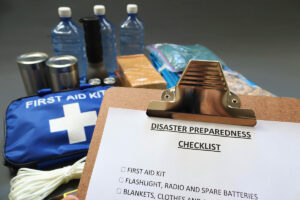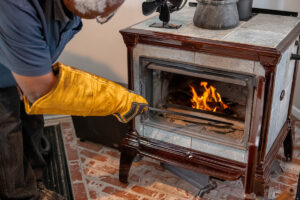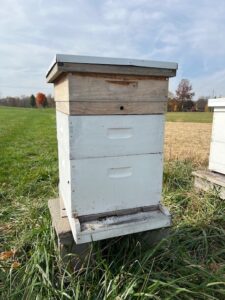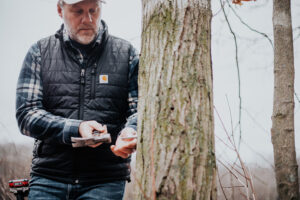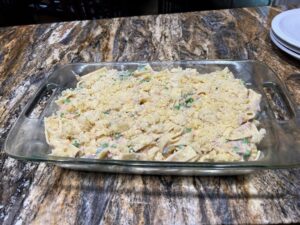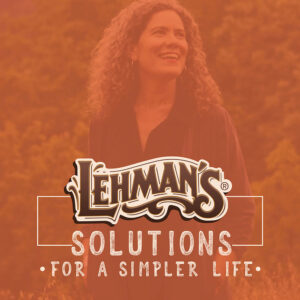Editor’s Note: After I started at Lehman’s, my good friends Tim and Laura shared that they are (at least for now), urban preppers, with the eventual goal of retiring off the grid. “We just love Lehman’s. They have everything we’d need at our retirement place.” Tim was gracious enough to give me an extended interview. In this final installment, he discusses their future plans, and his take on the current notoriety of the ‘prepper movement.’
 Tim is realistic about what a huge change in their lifestyle going off the grid would be, though the day that he and Laura make that change can’t come soon enough for him. “I do expect things to be a lot more work than now. A lot more. But it’ll be quieter, we’ll have more room to breathe. Right now, we live in heavily populated suburb. You can look into 40 windows. Everyone checks out everyone’s yard. The city has full-time yard checker. The day we moved in, she was measuring our grass. Measuring our grass, even though it was obvious we were moving in. We had this conversation”
Tim is realistic about what a huge change in their lifestyle going off the grid would be, though the day that he and Laura make that change can’t come soon enough for him. “I do expect things to be a lot more work than now. A lot more. But it’ll be quieter, we’ll have more room to breathe. Right now, we live in heavily populated suburb. You can look into 40 windows. Everyone checks out everyone’s yard. The city has full-time yard checker. The day we moved in, she was measuring our grass. Measuring our grass, even though it was obvious we were moving in. We had this conversation”
“Can I help you?”
“Sir, you’re in violation.”
“Of what?”
“Well, here in (city name withheld), your grass can’t be over 8 inches tall, and your grass is 8½ inches tall.”
“I was floored. I won’t miss suburbia a bit, let me say that.
He reflects a little more on their family’s planning process, on thinking ahead and being prepared for emergencies, and becomes very serious. Currently, the family has about three month’s worth of food, water and other supplies stored in the home, and they’re prepared to shelter in place should a crisis arise. “What we’re doing now is an insurance policy to get us to our future. Cautious, well-thought out preparation is your best insurance policy. We are prepared for the worst and hope for the best.”
 Tim continues on, citing Hurricane Katrina as a case in point. “Look at New Orleans, at Louisiana. I was there for a while; great food, beautiful people, but I couldn’t take it, the heat. I can’t imagine what it was like for those folks after Katrina. There was no water, there was no food, and the government couldn’t get water or food to them. Here, (in Ohio), we have storms, we have blizzards. You have to be able to take care of yourself, your family, for maybe as long as a month. The government can’t hold your hand. You have to take some responsibility for your own.”
Tim continues on, citing Hurricane Katrina as a case in point. “Look at New Orleans, at Louisiana. I was there for a while; great food, beautiful people, but I couldn’t take it, the heat. I can’t imagine what it was like for those folks after Katrina. There was no water, there was no food, and the government couldn’t get water or food to them. Here, (in Ohio), we have storms, we have blizzards. You have to be able to take care of yourself, your family, for maybe as long as a month. The government can’t hold your hand. You have to take some responsibility for your own.”
When asked about the popular culture image of preppers, Tim had no hesitation voicing his opinion. “Don’t fear. Fear blinds you. A lot of people who prep are fear-driven. That’s not the American way. Being clear-headed, planning ahead, that’s the American way.”
“We (his family) have full faith in this country. We’re hardcore patriots. But we don’t believe the end of world will happen. It’s good to have food stored up. It’s only common sense. I do not believe, like some doomers do, that the government will collapse, or the world will end. There may be other catastrophic problems, and those are what we prepare for, events that may be comparatively short-term. I worry about EMP (solar flare) events,a weather crisis, things like that.”
 His next statement proves that the future is constantly on his mind. “And it’s not just about food and water. You hear people say, ‘˜Have a thousand bucks cash in reserve, have three month’s salary put back. It’s not foolish. If you are between jobs, you get laid off, you have that cushion. And you can eat peanut butter or rice until you get back on your feet. Emergencies aren’t always the plague, or something like that. People forget that. Unemployment is an emergency. Illness is an emergency, you know? You have to think ahead, you have to have a plan. Never let circumstances catch you by surprise.”
His next statement proves that the future is constantly on his mind. “And it’s not just about food and water. You hear people say, ‘˜Have a thousand bucks cash in reserve, have three month’s salary put back. It’s not foolish. If you are between jobs, you get laid off, you have that cushion. And you can eat peanut butter or rice until you get back on your feet. Emergencies aren’t always the plague, or something like that. People forget that. Unemployment is an emergency. Illness is an emergency, you know? You have to think ahead, you have to have a plan. Never let circumstances catch you by surprise.”
He stops to think for a moment, and then finishes up his train of thought. I’m not a doomer. I’m a self-sufficent, repurposing kind of guy. I don’t think the government is going collapse, I don’t think there’s going to be another great plague. I don’t believe in any of that. Traditional values of doing for yourself, the family as community, reaching out to larger community, I’d like to get back to that. I’m not going to be the guy in the compound looking out at my community, guarding my peanut butter. I’m going to be the guy out helping in my community when trouble hits.”

